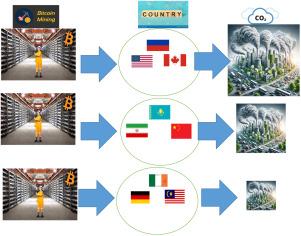The environmental cost of cryptocurrency: Analyzing CO2 emissions in the 9 leading mining countries
IF 4.9
2区 社会学
Q2 ENVIRONMENTAL SCIENCES
引用次数: 0
Abstract
This study examines the environmental impact of cryptocurrency mining, specifically its contribution to CO2 emissions, in nine countries that account for 90% of global mining: the United States, China, Russia, Canada, Germany, Malaysia, Kazakhstan, Ireland, and Iran. Utilizing monthly panel data from 2019 to 2022 across nine countries and applying both pooled and fixed effects econometric techniques, the analysis reveals that ”energy intensity” (the amount of energy used to produce a unit of GDP), as a moderator variable, influences the effect of cryptocurrency mining on CO2 emissions. Specifically, in countries where the annual energy intensity growth rate is greater than , cryptocurrency mining tends to result in higher CO2 emissions. Conversely, in countries with a growth rate of energy intensity below -6%, cryptocurrency mining results in lower CO2 emissions. The findings indicate that all nine countries experience a positive impact on CO2 emissions, albeit to varying degrees. The countries are categorized into three groups based on their performance: underperformers (Russia, the United States, Canada), neutral-effect countries (Iran, Kazakhstan, China), and positive performers (Ireland, Germany, Malaysia). This research underscores the urgent need for sustainable practices in cryptocurrency mining to mitigate its environmental effects.

加密货币的环境成本:分析9个主要采矿业国家的二氧化碳排放
本研究调查了占全球挖矿90%的九个国家的加密货币挖矿对环境的影响,特别是其对二氧化碳排放的贡献:美国、中国、俄罗斯、加拿大、德国、马来西亚、哈萨克斯坦、爱尔兰和伊朗。利用2019年至2022年九个国家的月度面板数据,并应用汇集效应和固定效应计量经济学技术,分析显示,“能源强度”(生产单位GDP所用的能源量)作为调节变量,影响加密货币开采对二氧化碳排放的影响。具体来说,在年能源强度增长率大于- 6%的国家,加密货币开采往往会导致更高的二氧化碳排放量。相反,在能源强度增长率低于-6%的国家,加密货币开采导致二氧化碳排放量降低。研究结果表明,所有九个国家都对二氧化碳排放产生了积极影响,尽管程度不同。这些国家根据他们的表现被分为三组:表现不佳的国家(俄罗斯、美国、加拿大),中性国家(伊朗、哈萨克斯坦、中国),以及表现良好的国家(爱尔兰、德国、马来西亚)。这项研究强调了在加密货币开采中迫切需要可持续的实践,以减轻其对环境的影响。
本文章由计算机程序翻译,如有差异,请以英文原文为准。
求助全文
约1分钟内获得全文
求助全文
来源期刊

Sustainable Futures
Social Sciences-Sociology and Political Science
CiteScore
9.30
自引率
1.80%
发文量
34
审稿时长
71 days
期刊介绍:
Sustainable Futures: is a journal focused on the intersection of sustainability, environment and technology from various disciplines in social sciences, and their larger implications for corporation, government, education institutions, regions and society both at present and in the future. It provides an advanced platform for studies related to sustainability and sustainable development in society, economics, environment, and culture. The scope of the journal is broad and encourages interdisciplinary research, as well as welcoming theoretical and practical research from all methodological approaches.
 求助内容:
求助内容: 应助结果提醒方式:
应助结果提醒方式:


